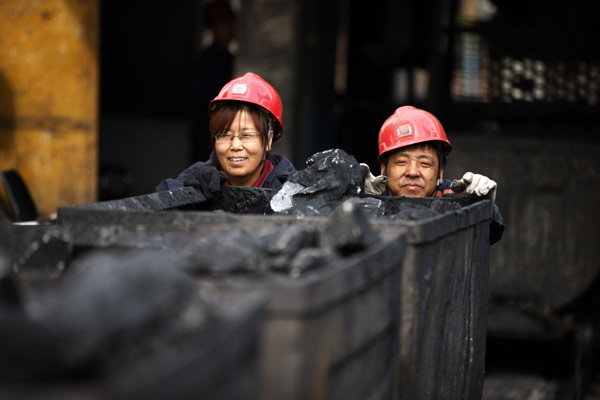Steel and coal companies reach capacity reduction annual targets early
Updated: 2016-10-26 08:31
By WANG YANFEI(China Daily)
|
|||||||||
 |
|
Workers at a coalmine in Huaibei, Anhui province. [Photo/China Daily] |
China is expected to reach the annual targets set for cutting overcapacity ahead of schedule this year, but pressure of excessive production suggests no easing up on the continued efforts.
China is expected to hit its annual target to reduce steel production by the end of this month and is expected to reach the goal for coal production by the end of November, according to Xu Kunlin, vice-minister of the National Development and Reform Commission, citing "strengthened supervision and inspection."
More than 80 percent of the target reductions were already reached in the two sectors by the end of September and some large scale State-owned enterprises have already reached their year-end targets, according to Xu.
Annual targets set for coal capacity and steel capacity reduction are 280 million and 45 million metric tons, respectively, according to Xu.
Xu made the remarks after 10 inspection teams were deployed by the State Council earlier last month, when progress "fell far behind the expected level."
"But fundamentals of production exceeding demand have yet to be changed and we will not see a major improvement in the near future," said Xu.
Demand for coal is expected to reach at most 4.1 billion tons by the end of 2020, while capacity will remain at 4.6 billion tons, according to Xu, suggesting further efforts are needed to upgrade the industries while cutting overcapacity.
"Recent soaring coal prices have made the task more challenging," he added, as an expected winter increase in demand for coal is pushing up prices.
Earlier this month, the commission allowed coal companies in areas with short supply to increase production and to extend working days from 276 to 330 this year.
Yang Fuqiang, a senior analyst at the Natural Resources Defense Council, warned that although government supervision helped facilitate hitting the short-term targets, a market-based approach should always be in place.
"Extended working days should only be allowed for companies with high-quality capacity, and the market should speak itself," said Yang.
In line with his remarks, Liu Shengjun, an economist with Lujiazui Institute of International Finance, said too much government intervention may have sent wrong signals to enterprises.
Related Stories
China's coal industry still plagued by overcapacity despite price rebound 2016-09-26 14:01
Cutting overcapacity needs all countries' work 2016-09-04 14:57
Overcapacity needs a global solution 2016-09-03 07:50
All countries should work together to cut steel overcapacity 2016-08-31 08:16
China's overcapacity cut not to harm global growth: spokesperson 2016-08-16 16:38
Today's Top News
Workers wield sledgehammers to tear down Calais 'Jungle'
UK university heads Chinese pregnancy research project
UK government opts for new Heathrow runway
Chinese hostages freed by pirates are heading home
China dominates Fintech 100
UK is bracing for airports expansion
Childrens' fate clouded as French camp demolished
Why Italy’s December referendum is not 'Brexit'
Hot Topics
Lunar probe , China growth forecasts, Emission rules get tougher, China seen through 'colored lens', International board,
Editor's Picks

|

|

|

|

|

|







